Net impact on productivity through the use of online recruiting versus traditional recruiting methods
Author(s)
DiMacchia, Timothy A. (Timothy Allen), 1963-
DownloadFull printable version (13.15Mb)
Other Contributors
Sloan School of Management.
Advisor
Erik Brynjolfsson.
Terms of use
Metadata
Show full item recordAbstract
With the explosion of the internet in the nineties, companies were transforming the way they conducted business from traditional business methodologies to a new paradigm involving an extensive force of change through increased information and communication. Within the 'internet-driven world', new technology was used to connect 'everyone to everything'. As their need and desire to deploy this new technology grew so did the demand for companies to expand their operations. Many companies were forced to adopt aggressive hiring techniques to satisfy their demand for new skills and services. Within Silicon Valley, as well as throughout the world, companies were growing at such an explosive rate that traditional -recruiting methods (such as the newspaper ads, trade publications, recruiting services, profiling services, referrals and/or executive search firms) couldn't scale to the demand. While these traditional methods had been effective for years, they began to lose ground to a new form of recruiting, eRecruiting/Online recruiting which offered real-time access to a vast array of prospective employees and company positions. More importantly, eRecruiting, offered a method for keeping pace with 'Internet Time'; allegedly a seven to one speed propulsion (where one internet year was equivalent to seven non-internet years) experienced by those caught up in this new era. This paper will evaluate the impact on productivity and return of investment of online recruiting versus traditional recruiting methods. Encompassing this evaluation will be a perspective of what is and is not working for eRecruiting followed by a series of recommendations to leverage the maximum return of this emerging e-channel.
Description
Thesis (M.B.A.)--Massachusetts Institute of Technology, Sloan School of Management, 2003. Page 184 blank. Includes bibliographical references (leaves 157-158).
Date issued
2003Department
Sloan School of ManagementPublisher
Massachusetts Institute of Technology
Keywords
Sloan School of Management.